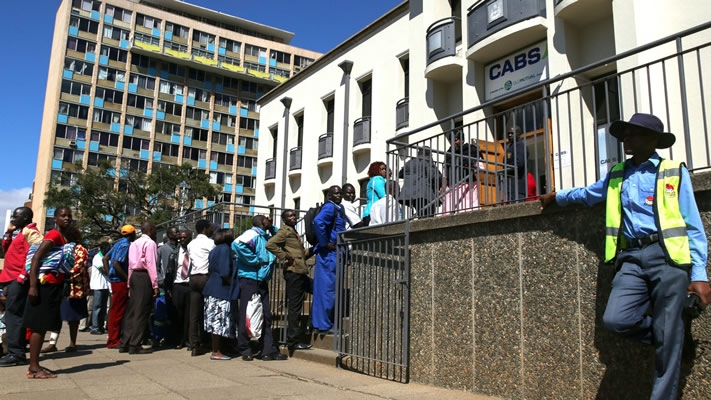Cash shortages in Zimbabwe are worsening as the introduction of bond notes, which is set for November, to stem the problem becomes imminent.

Some banks have reduced monthly withdrawal limits for individuals from 100 U.S. dollars a day to between 20 and 50 dollars, while companies are now allowed daily withdrawals of up to 500 dollars, down from 1,000 dollars.
ZB Bank, in which the government has a controlling stake, appears to be among the hardest hit, with branch managers’ first task in the morning being to tell anxious clients whether or not there is cash for withdrawals.
“I have no choice but to wait until there is cash to withdraw. We are always looking out for people with satchels and large envelops hoping that they will be coming to deposit cash and thus enable us to withdraw,” a ZB client waiting outside the bank’s Avondale branch said.
He complained that he would be making more trips to the bank this month because of the low withdrawal limits.
“I had become used to visiting the bank four or five times at the beginning of each month to withdraw my whole salary, but the lower withdrawal limits mean that I will have to come over for at least another week,” he lamented.
Mobile money banking has not been spared either, with recipients who had become used to getting instant cash now having to hop from one agent to another looking for money.
With some banks giving out very little, some people are now opting for retail shops which can give up to 100 dollars as cash-back for plastic money purchases of 15 dollars and above.
“I have bought all the groceries I need at home, so I am now buying my beer for the weekend using the Point of Sale machines so that I can get some cash,” said a customer in one of the retail shops on Thursday night.
“Sometimes I just have to create demand for some goods I would rather not buy,” he added.
Despite assurances that their U.S. dollar values will be maintained, many Zimbabweans have remained skeptical over the impending introduction of bond notes, to be effected in small doses of small denominations of 2 U.S dollar and 5 U.S. dollar equivalents.
The notes will be supported by a 200 million U.S. dollar facility from the Africa Export and Import Bank (Afreximbank).
An initial 75 million dollars worth of bond notes will be injected into the market by the end of the year.
Vice President Emmerson Mnangagwa said Thursday that the government was crafting a law that would support the introduction of the bond notes and Zimbabweans should prepare themselves for their coming.
“It is going to be reality. We are going to live with it. Those who can easily realize that reality should begin to accept that bond notes will be with us,” he said when he hosted a lunch following the opening of the 4th session of the 8th Parliament by President Robert Mugabe.
However, opposition parties and other interest groups are reportedly waiting for the promulgation of the law so that they can challenge its constitutionality.
A previous attempt to have the bond notes declared illegal was dismissed by the Constitutional Court in September on the basis that the legal challenge had been premature since no legal instrument had been put in place to support their introduction.
Reserve Bank of Zimbabwe governor John Mangudya said this week that the release of the notes had been moved to early November from the earlier planned end of October to allow their marketing.
He told the weekly private run newspaper, the Financial Gazette, that while there was public skepticism over the notes, they would help maintain the current multi-currency system rather than eliminate it.
Zimbabweans have expressed mixed feelings over the bond notes, with some fearing that they will ultimately become the sole national currency and lead to the hyper inflation of 2008/9 of over 231 million percent.
The notes will also be used as a funding mechanism to support an export incentive where exporters will be credited with 5 percent of their earnings in bond notes.
Mangudya said the bond notes would be released gradually into the economy in sympathy with export receipts through normal banking channels up to a maximum of 200 million dollars as supported by the Afreximbank facility. Xinhua






